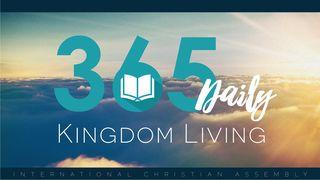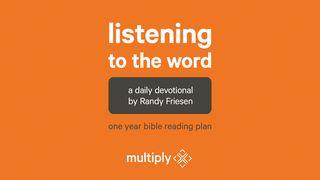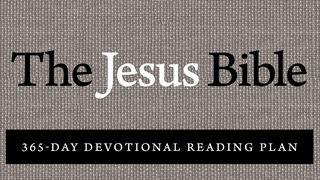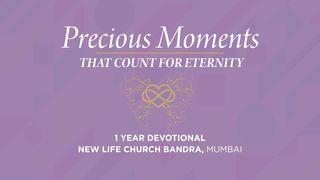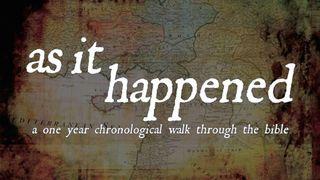For The Love Of GodSample

BROADLY SPEAKING, EZRA 10 is understood in two different ways:
According to the first view, what takes place is something akin to revival. Ezra’s tears and prayer prove so moving that the leaders of the community, though they too have been compromised by these intermarriages, enter into a pact to divorce their pagan wives and send them home to their own people, along with whatever children have sprung up from these marriages. Those who disagree with this decision will be expelled from the assembly of the exiles (Ezra 10:8), henceforth to be treated like foreigners themselves. The appropriate councils are set up, and the work is discharged. This is remarkably courageous, a sure sign of God’s blessing, ringing evidence that these people love God even more than they love their own families. The purity of the postexilic community is maintained, and the wrath of God is averted. The lesson, then, is that one must deal radically with sin.
According to the second view, although Ezra’s prayer (Ezra 9) is exactly right, the steps that flow from it are virtually all wrong. Marriage, after all, is a creation ordinance. In any case, one cannot simply undo a marriage; if the Law prohibits marriage with a pagan, it also prohibits easy divorce. What about all those children? Are they to be banished to their pagan grandparents, without any access to the covenant community and the one God of all the earth—quite apart from the psychological damage that doubtless will befall them? Could not other steps be taken instead? For example, all further mixed marriages could be proscribed and rigorously prevented, under the sanction of being expelled from the assembly. Priests who have intermarried could be stripped of priestly rights and duties. The kind of widespread repentance that is evident could be channeled toward faithful study of the Law, not least by these mixed families. What sanction is there for so inhumane an action as that in this chapter?
Strictly speaking, the text itself does not adjudicate between these two interpretations, though the first of the two is slightly more natural within the stance of the book. But is it more natural within the stance of the entire canon or of the Old Testament canon?
Without meaning to avoid the issue, I suspect that in large measure both views are correct. There is something noble and courageous about the action taken; there is also something heartless and reductionistic. One suspects that this is one of those mixed results in which the Bible frankly abounds, like the account of Gideon, or of Jephthah, or of Samson. Some sins have such complex tentacles that it is not surprising if solutions undertaken by repentant sinners are messy as well.
According to the first view, what takes place is something akin to revival. Ezra’s tears and prayer prove so moving that the leaders of the community, though they too have been compromised by these intermarriages, enter into a pact to divorce their pagan wives and send them home to their own people, along with whatever children have sprung up from these marriages. Those who disagree with this decision will be expelled from the assembly of the exiles (Ezra 10:8), henceforth to be treated like foreigners themselves. The appropriate councils are set up, and the work is discharged. This is remarkably courageous, a sure sign of God’s blessing, ringing evidence that these people love God even more than they love their own families. The purity of the postexilic community is maintained, and the wrath of God is averted. The lesson, then, is that one must deal radically with sin.
According to the second view, although Ezra’s prayer (Ezra 9) is exactly right, the steps that flow from it are virtually all wrong. Marriage, after all, is a creation ordinance. In any case, one cannot simply undo a marriage; if the Law prohibits marriage with a pagan, it also prohibits easy divorce. What about all those children? Are they to be banished to their pagan grandparents, without any access to the covenant community and the one God of all the earth—quite apart from the psychological damage that doubtless will befall them? Could not other steps be taken instead? For example, all further mixed marriages could be proscribed and rigorously prevented, under the sanction of being expelled from the assembly. Priests who have intermarried could be stripped of priestly rights and duties. The kind of widespread repentance that is evident could be channeled toward faithful study of the Law, not least by these mixed families. What sanction is there for so inhumane an action as that in this chapter?
Strictly speaking, the text itself does not adjudicate between these two interpretations, though the first of the two is slightly more natural within the stance of the book. But is it more natural within the stance of the entire canon or of the Old Testament canon?
Without meaning to avoid the issue, I suspect that in large measure both views are correct. There is something noble and courageous about the action taken; there is also something heartless and reductionistic. One suspects that this is one of those mixed results in which the Bible frankly abounds, like the account of Gideon, or of Jephthah, or of Samson. Some sins have such complex tentacles that it is not surprising if solutions undertaken by repentant sinners are messy as well.
Scripture
About this Plan

A daily devotional for discovering the riches of God's word: For the Love of God is a daily devotional designed to walk a person through the Bible in a year while assisting the reader in discovering the riches of God's Word. Our hope is that this daily devotional will deepen your understanding and appreciation of God's Word, for the love of God.
More
We would like to thank The Gospel Coalition for providing this plan. For more information, please visit: thegospelcoalition.org


